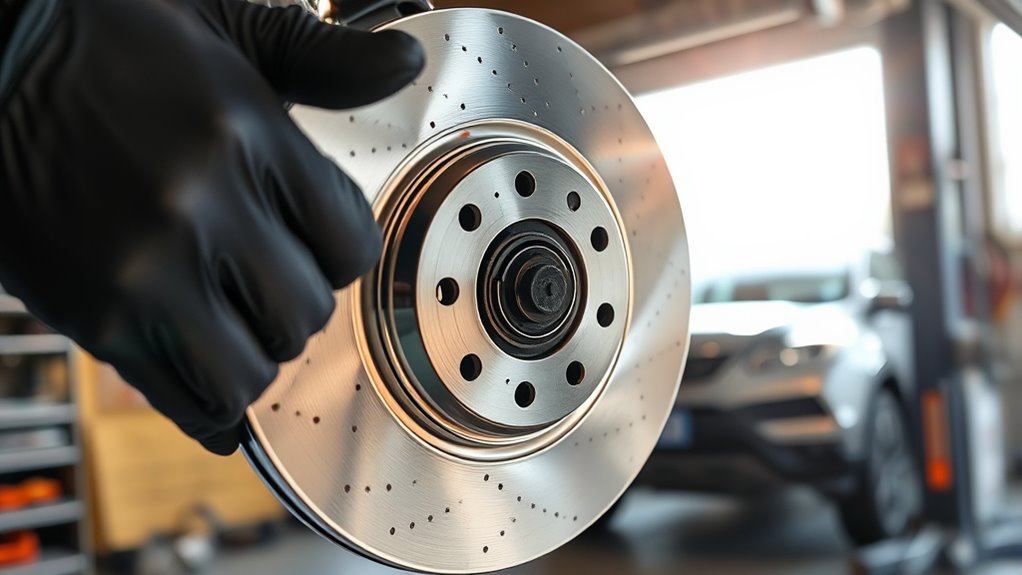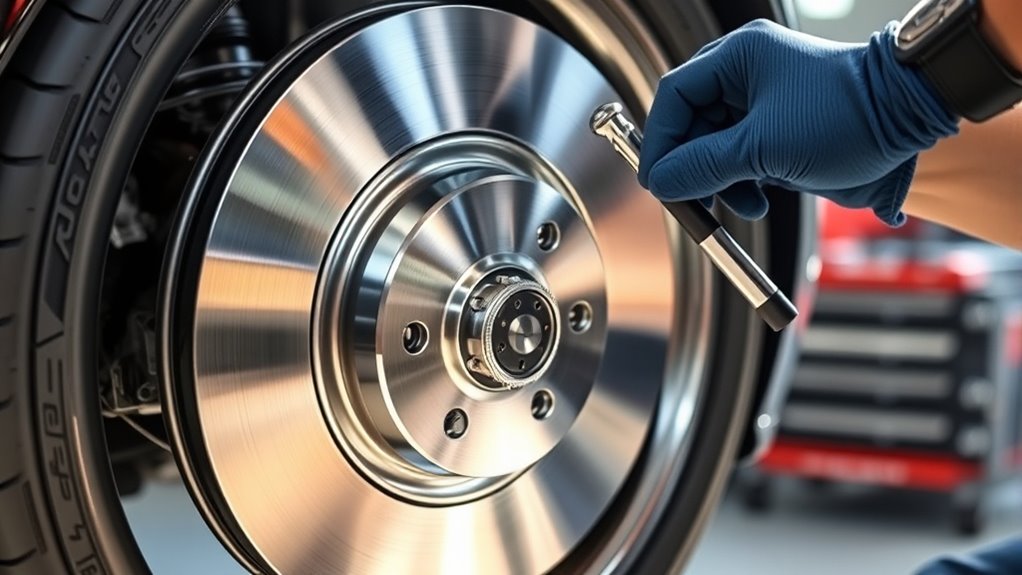A brake service plan is highly recommended if you want to keep your vehicle safe and reliable. It guarantees your brakes stay in good condition by scheduling regular inspections, brake pad replacements, and fluid checks. This proactive approach helps prevent costly repairs and keeps your stopping power at its best. If you want to learn how a plan can save you money and improve safety, keep exploring the benefits it offers for your vehicle.
Key Takeaways
- A brake service plan helps ensure regular inspections and maintenance, preventing costly repairs and safety hazards.
- If you drive frequently or in city traffic, a service plan can maintain optimal brake performance.
- Routine brake fluid checks and pad replacements through a plan improve vehicle safety and reliability.
- Less demanding drivers may still benefit from scheduled maintenance to avoid unexpected brake issues.
- Overall, a brake service plan promotes proactive care, extending brake system lifespan and ensuring safe stopping whenever needed.

Are you prepared to keep your vehicle stopping safely and reliably? Regular brake service is essential to guarantee your safety on the road, and understanding when and why to get a brake service plan can make all the difference. One of the first steps in brake maintenance is knowing when to consider brake pad replacement. Over time, brake pads wear down from regular use, and ignoring their condition can lead to reduced braking performance or damage to other components like rotors. By staying on top of brake pad replacement, you prevent costly repairs and maintain peak stopping power. A good brake service plan often includes routine inspections that alert you when your brake pads need attention, saving you from unexpected breakdowns or safety hazards.
Regular brake checks and timely pad replacements ensure safe, reliable stopping and prevent costly repairs.
Another critical aspect of brake maintenance is the brake fluid check. Brake fluid is essential for transmitting force from your brake pedal to the brake components. Over time, brake fluid can absorb moisture, which lowers its boiling point and diminishes braking efficiency. Regular brake fluid checks ensure that your fluid remains clean and effective, preventing brake fade or failure during sudden stops. If your brake fluid is contaminated or low, a professional service can flush and replace it, restoring dependable braking performance. Incorporating these checks into your brake service plan keeps your braking system functioning smoothly and helps avoid the risks associated with brake failure. Additionally, understanding the technology behind brake systems can help you appreciate the importance of regular maintenance and early detection of issues.
Deciding whether to enroll in a brake service plan depends on your driving habits and vehicle usage. If you drive frequently, especially in city traffic or hilly terrain, your brakes endure more stress and wear faster. In such cases, a comprehensive brake service plan offers peace of mind, ensuring that inspections, brake pad replacements, and brake fluid checks are scheduled regularly. This proactive approach saves money in the long run and minimizes the chances of experiencing sudden brake issues. Even if your driving is less demanding, periodic brake maintenance remains essential; a maintenance plan helps you stay ahead of potential problems before they escalate.
In addition to safety, a brake service plan can extend the life of your braking system, improve vehicle performance, and even enhance fuel efficiency. Regular inspections identify minor issues early, preventing them from becoming major repairs. When you commit to a scheduled brake service, you’re investing in your safety and peace of mind. Ultimately, no matter how often you drive, staying proactive with brake pad replacements and brake fluid checks ensures your vehicle stops reliably whenever you need it. So, ask yourself if you’re ready to prioritize your safety—if you are, a brake service plan is a smart choice to keep your vehicle’s stopping power in top condition.
Frequently Asked Questions
How Often Should I Schedule Brake Inspections?
You should schedule brake inspections at least once every 12,000 miles or annually, whichever comes first. During these visits, your mechanic will check the brake fluid levels and condition, as well as caliper maintenance. Regular inspections help prevent issues like brake fluid leaks or caliper failure, ensuring your brakes work reliably when you need them most. Don’t wait—staying proactive keeps you safe on the road.
Can a Brake Service Plan Save Me Money Long-Term?
A brake service plan can save you money long-term by catching brake wear early, preventing costly emergency repairs. Regular inspections and maintenance make certain your brakes stay in top condition, reducing the risk of sudden failures. With a plan, you avoid unexpected expenses and extend brake life, giving you peace of mind and saving money over time. Investing in routine care is a smart way to protect your vehicle and your wallet.
What Does a Typical Brake Service Plan Include?
You might think a brake service plan is just a fancy way to pay more, but it actually covers essential repairs like brake pad replacement and brake fluid flush. Typically, it includes regular inspections, brake pad replacements, fluid checks, and sometimes even rotor servicing. This plan guarantees your brakes stay reliable, saving you stress and money in the long run—so yes, it’s worth considering for peace of mind and safety.
Are Brake Service Plans Available for All Vehicle Types?
Yes, brake service plans are available for all vehicle types. Whether you drive a small car or a heavy-duty truck, these plans cover essential maintenance like replacing brake pads and checking brake fluid levels. Regular inspections help prevent issues like worn brake pads or low brake fluid, ensuring your vehicle’s braking system stays reliable. No matter your vehicle, a brake service plan can keep your brakes in top condition and improve safety.
How Do I Choose the Right Brake Service Plan for My Car?
To select the appropriate brake service plan, consider your driving habits and your vehicle’s needs. Look for a plan that covers brake pad replacement and includes regular brake fluid checks to maintain ideal performance. Ask about the plan’s coverage for wear-and-tear parts and service intervals. Comparing options helps guarantee you get a plan that offers the best value and keeps your brakes in top condition.
Conclusion
So, think about it—your brakes are the unsung heroes stopping you from chaos every day. Skipping a service plan might seem harmless until that one time your brakes fail, and suddenly, you’re the star of an unintended crash scene. Ironically, a simple plan could save you from a costly disaster. Don’t wait for your brakes to whisper “goodbye”—invest now, and keep life’s surprises safely on the road.









